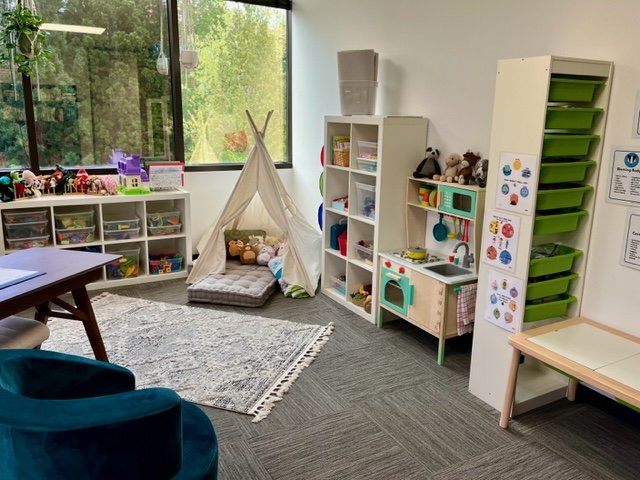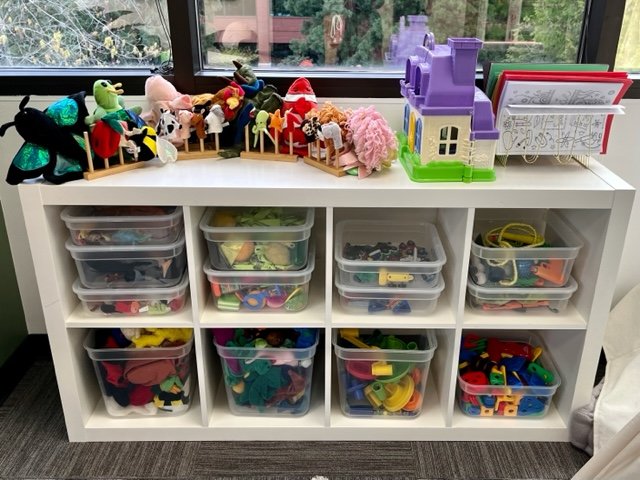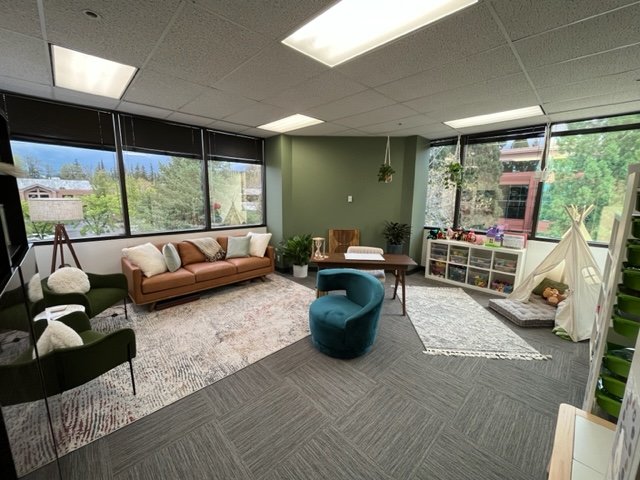






play therapy & parent support
Play Therapy helps children communicate their inner experiences through the use of toys. In the playroom we use sand, art, clay, and toys to create a welcoming environment where a child’s anxiety and resistance to change decreases and their openness to learning new skills and practicing new coping increases, encouraging an overall sense of mastery. Children learn to:
experience and express emotion
develop new and creative solutions to problems
develop social and relational skills with family/peers
become more responsible for their behaviors
develop respect and acceptance of self and others
cultivate empathy and respect for thoughts and feelings of others
develop self-efficacy and confidence in their abilities
What to expect:
FAMILY TIME: We’ll start each session with the child and parent/caregiver sharing about their week followed by a play-based activity to rehearse new skill sets and be supported by the playful engagement of parents/caregivers.
PLAY TIME: Next it’s time for kiddos to process in a child-centered environment where they get to choose and direct their activities in many of the ways they would like to. That might look like imaginative play with toys or puppets, inviting the therapist into their play, creating art, or exploring movement. Play based assessment allows your therapist to see how the child perceives their family and social environment as well as how they cope with new situations, their problems, and the world around them.
PARENT/CAREGIVER MEETINGS: Every month - 6 weeks we will have a separate session with the caregiver(s) to collaborate on our observations and provide support on specific parenting tools to strengthen the relationship with your child and support their therapeutic goals.
children ages 3 - 12
You can discover more about a person in an hour of play than you can in a year of conversation. —Plato
Play Therapy helps children & tweens with:
behavioral challenges (i.e., anger, school refusal, eating, sleeping)
relationship difficulties with peers or siblings
anxiety (excessive worry or fear)
depression (loss in interest/motivation)
life transitions (divorce, moving, changing schools)
social engagement (shy, fearful, withdrawn)
self control and impulsivity
self-esteem and identity
grief and loss
processing trauma (witnessed or experienced)
expressive arts therapy & parent support
It can seem overwhelming for your tween/teen to have to talk with a stranger about their challenges and feelings. But talking about their creation or playing a game makes it easier to get the conversation started. Combining the creative process with psychological therapies creates an environment to explore emotional growth and healing at your tween/teen’s own pace.
What to expect:
WEEKLY SESSIONS: Tweens/Teens get to choose which creative activity they want to engage with each session. That might look like smoothing the sand and building a miniature world in a sandtray, playing a game, sharing playlists and songs that capture the emotions they are feeling, journaling, or creating art in a variety of mediums. The creative process facilitates conversation on their inner and outer emotional experience. From there we can explore new tools to help your teen:
experience and express emotion
develop new and creative solutions to problems
enhance social and relational skills with family/peers
become more responsible for their behaviors
develop respect and acceptance of self and others
cultivate empathy and respect for thoughts and feelings of others
develop self-efficacy and confidence in their abilities
manage stress and new responsibilities
FAMILY MEETINGS: Every eight weeks we will have a family session to collaborate on how your teen would like to be supported in their therapy goals.
PARENTING SUPPORT: Parents are encouraged to join one of our parenting support groups that meets monthly to explore tools to strengthen your relationship and navigate setting limits as your teen is growing and getting ready to launch into adulthood.
tweens & teens age 10+
From the first touch of the sand, there is often a palpable release of tension, as the body begins to find its natural rhythm again. —Bonnie Badenoch
Expressive Arts Therapy helps tweens & teens with:
behavioral challenges (i.e., anger, school refusal, sleeping)
relationship difficulties with peers or siblings
anxiety (excessive worry or fear)
depression (loss in interest/motivation)
life transitions (divorce, moving, changing schools)
social engagement (shy, fearful, withdrawn)
self control and impulsivity
self-esteem and identity
body image and eating
self-harm and suicidal thoughts
grief and loss
processing trauma (witnessed or experienced)
family therapy
all ages & groupings
family therapy can help with:
improving communication, family dynamics and relationships
developing healthy boundaries
defining roles within a family
providing new coping tools
improving problem-solving
adapting to life changes
dealing with chronic illness or death
conflicts: sibling or parent-child
blended families
co-parenting with divorce
family therapy
Book a 15 minute consultation and see if we’re the right fit for you.
There’s no commitment, pressure, or obligation.






